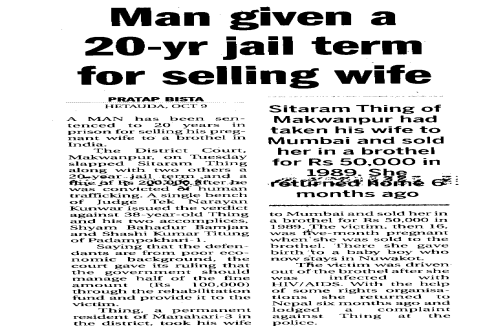
When the District Court of Makwanpur convicted three human traffickers in October 2012—sentencing them to 20 years in prison and a fine of 200,000 Nepalese rupees each ($2,256)—it created a nationwide stir and garnered wide media coverage. The successful conviction was a groundbreaking and unprecedented step in Nepal’s judicial and anti-human trafficking history, and provided a much needed ray of hope in the ongoing struggle to achieve justice for trafficking victims like Maya.
Maya (name changed to protect confidentiality) was only 16 and pregnant with her first child when she was ruthlessly sold to a brothel in Mumbai by her own husband. After spending 20 years in this nightmarish life, she learned that she was infected with HIV/AIDS and was then confined to household chores. It was during one of her errands that she met a Nepali woman who finally helped her escape. Maya returned to her village in 2012 knowing that her struggle had not ended. Battling stigma and ostracism was just a part of it—what she really wanted was her traffickers to be put behind bars.
When the Forum for Protection of People’s Rights (PPR), a USAID/Nepal Counter-Trafficking in Persons (C-TIP) program implementing partner, came to her village, Maya knew where to turn and exactly what to do. PPR was there to increase community awareness on the different aspects of trafficking in persons and on the legal provisions set by Nepal’s Human Trafficking and Transportation Control Act of 2007 to protect the rights of trafficking victims.
Determined to help Maya, PPR joined forces with the Legal Aid and Consultancy Centre, also a USAID C-TIP partner. Through its district lawyers, the organization provided legal counseling to Maya and got her to file a complaint with the police, leading to a trial in District Court. The district lawyers further helped procure the necessary testimonials and supported the district attorney in getting the victim’s witness testimony, preparing the pleading note and appealing the case in court.
The evidence and the victim’s testimony presented a strong case for District Judge Tek Narayan Kunwar to convict the perpetrators. In this case, the traffickers pleaded that they were from poor economic backgrounds and unable to pay the full fine. Kunwar ruled that half of the fine would be supplemented by the Government of Nepal’s Rehabilitation Fund. This judgment set a new and promising landmark not only because it safeguarded the victim’s right to “adequate compensation,” but also because state funds are rarely used to support compensation for trafficking victims. So far, there have been 18 convictions and 26 filed cases as a result of legal assistance provided to victims under USAID’s C-TIP program in Nepal.
Despite considerable steps taken by the Government of Nepal, such as passing the Human Trafficking and Transportation Control Act of 2007, a persistently low rate of prosecutions reflects poor understanding and coordination among law enforcement and judicial officials regarding their responsibilities under the law. The National Judicial Academy, with support from USAID’s C-TIP program, conducted training on prosecution and adjudication for appellate court judges, district court judges and government attorneys in July 2012 for 21 judicial officers. One of those training participants was Judge Kunwar, who certainly applied the lessons learned from that training to achieving his landmark conviction.







Comment
Make a general inquiry or suggest an improvement.